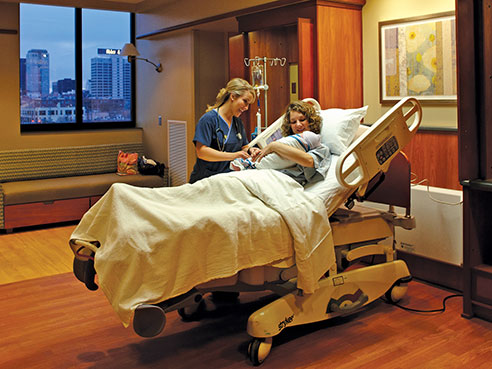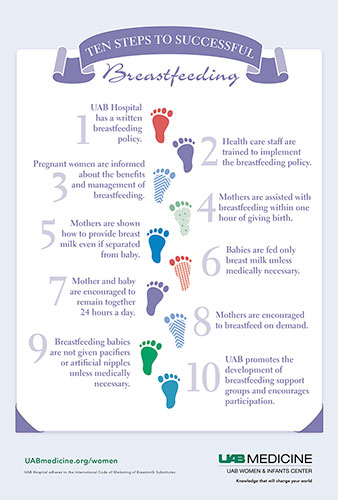 UAB Hospital has been designated a Baby-Friendly birth facility for its work in changing the perception and culture of breastfeeding in Birmingham by Baby Friendly USA.
UAB Hospital has been designated a Baby-Friendly birth facility for its work in changing the perception and culture of breastfeeding in Birmingham by Baby Friendly USA.
This prestigious international recognition comes from Baby Friendly USA’s Baby-Friendly Hospital Initiative, a global program that encourages and recognizes hospitals and birthing centers that offer an optimal level of care for breastfeeding mothers and their babies.
As Birmingham’s only Baby-Friendly hospital, UAB Hospital practices the Ten Steps to Successful Breastfeeding, providing breastfeeding mothers the information, confidence and skills needed to successfully initiate and continue breastfeeding their babies. Baby-Friendly Designation recognizes evidence-based findings that breast milk provides the optimal nutrition for babies.
“We have long had a goal of improving breastfeeding rates for our patients,” said UAB Newborn Nursery Medical Director DeeAnne Jackson, M.D. “Participation in Best Fed Beginnings and the Baby-Friendly Hospital Initiative gave us the tools that we needed to achieve this goal. This has been a true team effort involving everyone who cares for pregnant or postpartum women and newborns from the prenatal clinics to Labor and Delivery through providers on the Mother Baby Unit, Newborn Nursery, and the Regional Newborn Intensive Care Unit/Continuing Care Nursery.”
The Southeast has the lowest breastfeeding rates in the nation resulting in high rates of various health problems that breastfeeding can help prevent, such as childhood obesity. Increasing breastfeeding rates requires a culture shift for patients and providers to ensure children receive optimal nutrition.
UAB Hospital was selected as one of 90 hospitals to participate in the CDC-funded National Initiative for Child Healthcare Quality’s Best Fed Beginnings project. The NICHQ supported UAB Hospital in implementing the Ten Steps to Successful Breastfeeding, a requirement for facilities to receive the Baby-Friendly Designation.
“Being a part of NICHQ’s Best Fed Beginnings project helped to facilitate our collaboration with others and offer maternity care that supports the mother who chooses to provide breast milk for her baby,” said Sylvia Edwards, a lactation consultant. “The journey to Baby-Friendly Designation has truly changed our culture, and our mothers and babies are reaping the benefits.”
In 2011, Edwards saw an opportunity to improve UAB’s exclusive breastfeeding rates. She and Elicia Jacob, DNP, director of Nursing, made the recommendation for UAB Hospital to pursue the Baby-Friendly Designation.
 Click to enlargeAs women’s health clinicians working with infants and their families every day, Jacob and Edwards recognized how implementing baby-friendly practices would enhance the foundation of the Patient and Family-Centered Care delivery model. Edwards understood that integrating the core principles of PFCC into baby-friendly practices would create a culture that supports collaboration and information sharing.
Click to enlargeAs women’s health clinicians working with infants and their families every day, Jacob and Edwards recognized how implementing baby-friendly practices would enhance the foundation of the Patient and Family-Centered Care delivery model. Edwards understood that integrating the core principles of PFCC into baby-friendly practices would create a culture that supports collaboration and information sharing.
UAB Women and Infants Services oversaw a rigorous three-year quality improvement process to achieve the Baby-Friendly Designation and ensure the 10-step process is practiced with new mothers and babies.
In May 2012, Jacob and Edwards began acquiring resources to support the move to being a Baby-Friendly hospital, including an Innovation Grant of $5,000 to determine which baby-friendly strategies would best serve the community and staff. Focus groups were conducted with front-line staff, pregnant women, postpartum mothers and their support person to help develop education and print materials on breastfeeding for mothers and their support system.
UAB Women and Infants Center has 11 lactation nurses on staff certified by the International Board of Lactation Consultants to educate, care for and support breastfeeding mothers through the whole continuum of care, from the first prenatal appointment through birth and up to 12 weeks after delivery. The lactation and nursing staff supports and encourages new moms by holding their hand through every phase of breastfeeding.
Prenatal education teaches expectant mothers the health benefits of breastfeeding and risks of formula feeding. UAB Women and Infants Services provides new moms with information on what to expect during the birth process and postpartum period, including skin-to-skin contact for the baby, initiating breastfeeding immediately after delivery and 24-hour rooming-in for well infants with their mother during their birth hospitalization.
For some women, this represents a significant change in care from previous deliveries or from the experience of family members, and it is important to understand the reasons for and benefits of the change in practice. Community support groups and weekly phone calls have been established to identify and address any issues or concerns that come up while new mothers are breastfeeding.
“The Baby-Friendly Designation is an excellent demonstration of the great teamwork and care we always strive to provide to our patient population and a clear example of the challenges and barriers we can conquer,” said Joseph Biggio Jr., M.D., executive medical director for UAB Women and Infants Services.
More than 1,000 care team providers on the front line at the UAB Women and Infants Center are working to change misconceptions on breastfeeding with the help of community partners, area pediatricians and OB/GYNs as they encourage and educate on the benefits of breastfeeding. UAB Hospital has seen exclusive breastfeeding mothers increase from 2.8 percent in 2011 to more than 60 percent this year, a significant increase and culture shift. Partners in this endeavor include the Jefferson County Department of Health WIC office, UAB School of Nursing, UAB School of Public Health, Perinatal Regional Director, Alabama Breastfeeding Committee, the NICHQ, patients of UAB Women and Infants Services, and many others.